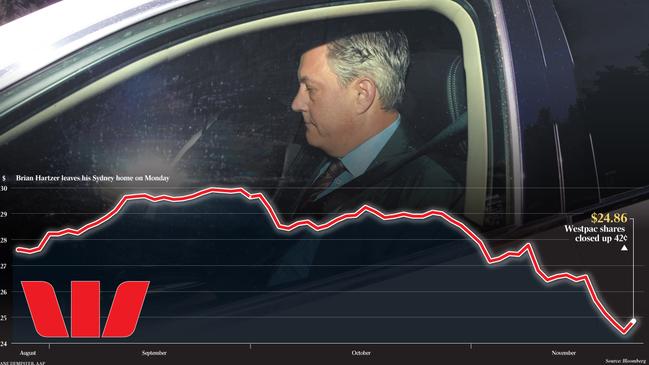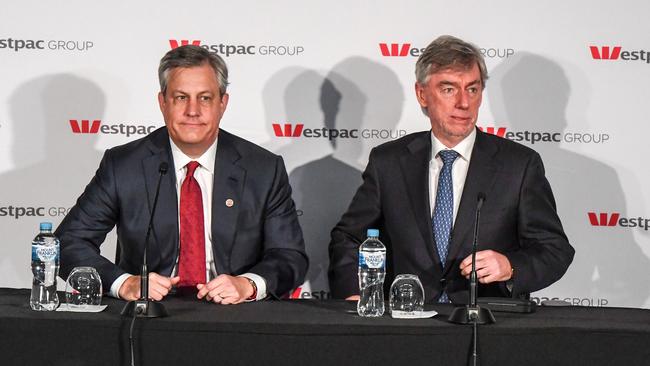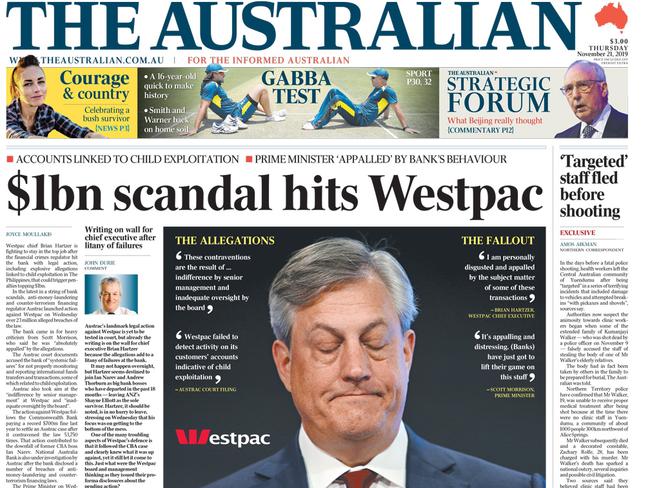Denial adds to Westpac’s sins in banking scandal
Westpac’s leaders have been totally caught out by the pace of events unfolding in recent days.

The longstanding Westpac chairman would not survive the toxic aftermath of Westpac’s money-laundering scandal. Letting chief executive Brian Hartzer go would not be enough. Maxsted had to go, too.
At a series of meetings on Monday in his home town, Melbourne, and phone hook-ups to Sydney with the big institutions that control Westpac’s shares, Maxsted was left in no doubt of the extent of investor anger — disgust, even — at what had been allowed to happen at the country’s second biggest bank.
Big fund managers were aghast at the seeming delay in Westpac taking accountability for the shocking claims made by Austrac of enabling child exploitation in The Philippines.
“It was made clear to him that we needed to see accountability to restore stability to the share price,” an investor at one of the meetings with Maxsted said.
“Waiting three or four months until the outcome of an independent review was not going to cut it.”
After taking what seemed to many to be an eternity to act on Austrac’s allegations, Westpac moved quickly and — it hopes — decisively on Tuesday, ending the career of Hartzer and bringing to an early close the board stints of Maxsted and Ewen Crouch.
The moves leave Australia’s oldest company humiliated, seeking fresh leadership and hobbled for months to come as it deals with the fallout from a scandal all its own making

‘Systemic failures’
Since financial transactions reporting agency Austrac brought a bombshell court action over the bank last Wednesday, Westpac had been stoutly defending its actions.
Hartzer was appalled by allegations that among 23 million breaches of the bank’s reporting requirements under anti-money-laundering and counter-terrorism financing laws were a dozen accounts siphoning hundreds of thousands of dollars to facilitate pedophilia and child pornography in The Philippines.
He wanted to stay and said he was determined to lead the bank’s response to these claims but faced mounting pressure from Canberra, from the sharemarket and the big and increasingly vocal investors that dominate its share register.
Westpac shares had been in free fall since last week, down 8 per cent by the time the board decided to act. From Canberra the bank was being assailed by ever-more pointed comments from senior government ministers, who accused the bank of aiding and abetting pedophiles and child exploitation in The Philippines.
And hanging over all of this an assessment from Austrac, deemed instantly lethal, that it was “the result of systemic failures in its control environment, indifference by senior management and inadequate oversight by the board”.
Sudden about-face
Yet the decision to offer up Hartzer, as well as Maxsted and the head of the board risk committee, Crouch, was an about-face as dramatic as it was predictable.
And it was completely at odds with the message given by Hartzer to the troops that same day.
Extraordinary comments from Hartzer, reported in The Australian on Tuesday, revealed just how far apart the senior echelons of the bank were from the views of its owners and the wider public.
Even as Maxsted was meeting investors, Hartzer played down the significance of the Austrac case to a meeting of the bank’s senior executives.
“This is not an Enron or Lehman Brothers,” the chief executive said in a reference to two of the most notorious financial collapses of the past 20 years. “We will get through this.”
The Austrac issue “was not playing out as a High Street issue”, he told the meeting.
“We all read the Fin (The Australian Financial Review) and The Australian, and we all read that and think the world is ending.

“But, actually, for people in mainstream Australia going about their daily lives, this is not a major issue so we don’t need to overcook this.”
Hartzer was unavailable on Tuesday to explain his comments. Perhaps he was putting a brave face on a situation that had the potential to spin dangerously out of his control.
Hartzer had been in discussions with the Treasury secretaries of NSW and the ACT governments about emerging threats from them to move their lucrative banking services out of Westpac.
“He told them both that if state governments start withdrawing their deposits then this reputational crisis would turn into a full-blown banking crisis that would damage the economy and that the states should be wary of that,” a source said.
Spinning a solution
Another theory holds that the bank’s “matrix” management system — which has dotted rather than firm lines blurring accountability between different divisions and layers of management — would act as a firewall against Hartzer being held responsible.
Or perhaps he genuinely had a tin ear for the chorus of demands for accountability that had been building since last week.
Certainly up until then Westpac had been preparing as though the issue would blow over.
The board and executive team had been meeting all Saturday to sign off on an announcement that would go out on Sunday setting out in more detail the bank’s contrition and steps it planned to take.
“The strategy is to use PR and spin to get out of this mess without doing anything to fix the real problem,” said an insider familiar with the planning at the weekend.
A draft plan overseen by Westpac’s group executive for corporate and customer relations, Carolyn McCann, on Saturday would have included two key parts. Westpac would donate money to two charities that combated child exploitation, one each in The Philippines and Australia. It also would set up a new forum to find new solutions to beat child exploitation, a move insiders said copied the Australian Centre to Counter Child Exploitation, which Home Affairs Minister Peter Dutton set up last year. As it happens, Dutton is also the minister responsible for Austrac.
“So the plan to save everyone’s job is to set up a forum to copy what the government is already doing well, rather than fix what the bank is doing poorly,” one critic said. “There was silence when someone asked who would even want to be part of Westpac’s forum at this time.”
Frydenberg intervenes
But another intervention, this time from Josh Frydenberg, forced a change in plans.
Appearing on the ABC Insiders show on Sunday, the federal Treasurer revealed the Australian Prudential Regulation Authority, which has sweeping powers to direct the banks — including effectively sacking executives — had also been called in to investigate Westpac’s activities.
“There must be accountability, and that will obviously involve decisions (taken) about the futures of senior management, as well as the board,” Frydenberg said. “There has been indifference by the board, there’s been a systemic failure by the bank and there’s been inadequate oversight.
“Don’t forget: we had the Commonwealth Bank experience with, again, breaches of anti-money-laundering laws — history shows you that these issues build a momentum of their own.”
A new plan
As the board met again on Sunday, aspects of the Saturday plan were scrapped, including the proposed forum.
Instead, Westpac would announce the shutdown of the LitePay service, which had been established in 2016 as an alternative international payments system and became the medium for the child pornography payments.
Bonuses for some executives would be withheld pending an investigation and a total of $34m committed to a range of charities addressing child exploitation in The Philippines.
Another vital part of the plan was to address the increasingly heated rhetoric from Canberra. According to an insider at the bank, David Lindberg, the ambitious head of Westpac’s consumer division, had volunteered to go to Parliament House on Tuesday to meet politicians and sell the bank’s action plan.
The Austrac scandal would be pitched as an error for which no one could be held responsible. The calculation was that Canberra’s own momentum — with union-busting legislation and the continuing scandals over Energy Minister Angus Taylor — would serve as a distraction from the issues that Westpac was now acting to address.
That proved to be fanciful. After Scott Morrison’s calls for accountability last week and Frydenberg on Sunday, Dutton ramped up the rhetoric, accusing Westpac of “giving a free pass to pedophiles”.
In Melbourne Maxsted was doing the rounds of investors at the Paris end of Collins Street, among them the Future Fund chaired by Peter Costello, the $180bn AustralianSuper and the Australian Council of Superannuation Investors, an umbrella body for the powerful industry funds movement and a range of international investors controlling $2.2 trillion in funds that is a leading voice on how to run public companies in the shareholder interest.
“Long-term investors made it clear to Westpac that accountability was required,” ACSI chief executive Louise Davidson said.
“This includes a preparedness to take proportionate action to improve governance and for the impact of these events to be fully reflected in remuneration outcomes.”
To hear Maxsted tell it, Monday was the first opportunity he had to talk to investors amid the chaos unleashed by last week’s announcement.
“Whilst it seems like an eternity to me and I’m sure to you in terms of how long you’ve known about this, it is only six days, it is only six days,” Maxsted pleaded on Tuesday in defence against claims the bank had a tin ear to community concerns.
“It wasn’t through a lack of urgency. We wanted to make sure that the market was fully informed on our views.
“You know, for the CEO to lose his job in these circumstances, we felt due process had to be followed, not so much that it went forever obviously but a matter of a few days for us to try and understand what the right decision was.”
Hartzer will be replaced by Peter King, the chief financial officer who only last month had announced plans to retire from the bank next year.
Maxsted, has brought forward plans to leave the board to next year, setting an inglorious exit for a professional director regularly described as principled and calm after nine years at the helm.
And Crouch, the head of the bank’s risk committee — where critics argue the issues flagged by Austrac should have been surfaced and dealt with — will not seek re-election.
Whether that will be enough to satisfy shareholders won’t be known until December 12, when the bank faces shareholders at the annual meeting in Sydney.
Hanging over everything the bank has done in the past week is the threat that the whole board could find themselves out of work. After shareholders delivered a thumping 66 per cent no vote against Westpac’s pay practices last year, anything over 25 per cent “against” this year will trigger an automatic vote to spill the board.
As well, four directors, (excluding Crouch), face shareholder votes to remain on the board. Even after Tuesday’s bloodletting, there is no guarantee the worst has passed.
At least some shareholders believe more need to go to before the bank wins back their trust.


Lindsay Maxsted was at the end of a packed day of meetings and phone hook-ups with big investors on Monday when the ugly truth dawned on him.